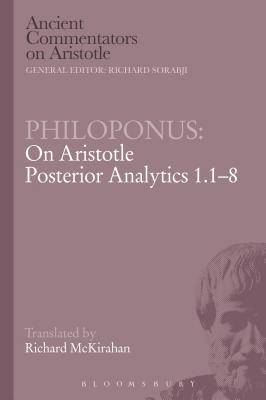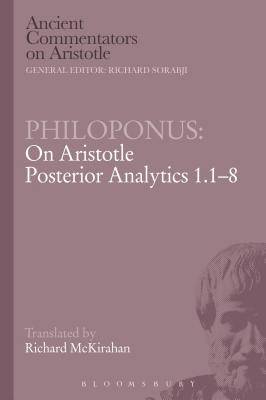
- Afhalen na 1 uur in een winkel met voorraad
- Gratis thuislevering in België vanaf € 30
- Ruim aanbod met 7 miljoen producten
- Afhalen na 1 uur in een winkel met voorraad
- Gratis thuislevering in België vanaf € 30
- Ruim aanbod met 7 miljoen producten
Zoeken
Omschrijving
Aristotle's Posterior Analytics elaborates for the first time in the history of Western philosophy the notions of science and the requirements for the distinctive kind of knowledge scientists possess. His model is mathematics and his treatment of science amounts to a philosophical discussion, from the perspective of Aristotelian syllogistic, of mathematical proofs and the principles they are based on. Chapters 1-8 expound the foundations of Aristotle's theory, pointing out the similarities and differences between scientific knowledge and other types of knowledge, establishing the need for basic principles, and identifying the types of principles and the source of necessity associated with scientific facts. Philoponus' massive commentary, the most complete ancient discussion of Posterior Analytics Book 1, offers uniquely valuable testimony to the way this book was read and understood in late antiquity, as well as providing information on earlier interpretations. Of particular interest is Philoponus' account of scientific principles, which is based not only on Aristotle but also on the Greek mathematical tradition, especially Euclid and his commentator Proclus.
Specificaties
Betrokkenen
- Auteur(s):
- Vertaler(s):
- Uitgeverij:
Inhoud
- Aantal bladzijden:
- 192
- Taal:
- Engels
- Reeks:
Eigenschappen
- Productcode (EAN):
- 9781472558183
- Verschijningsdatum:
- 10/04/2014
- Uitvoering:
- Paperback
- Formaat:
- Trade paperback (VS)
- Afmetingen:
- 156 mm x 234 mm
- Gewicht:
- 276 g

Alleen bij Standaard Boekhandel
+ 176 punten op je klantenkaart van Standaard Boekhandel
Beoordelingen
We publiceren alleen reviews die voldoen aan de voorwaarden voor reviews. Bekijk onze voorwaarden voor reviews.








